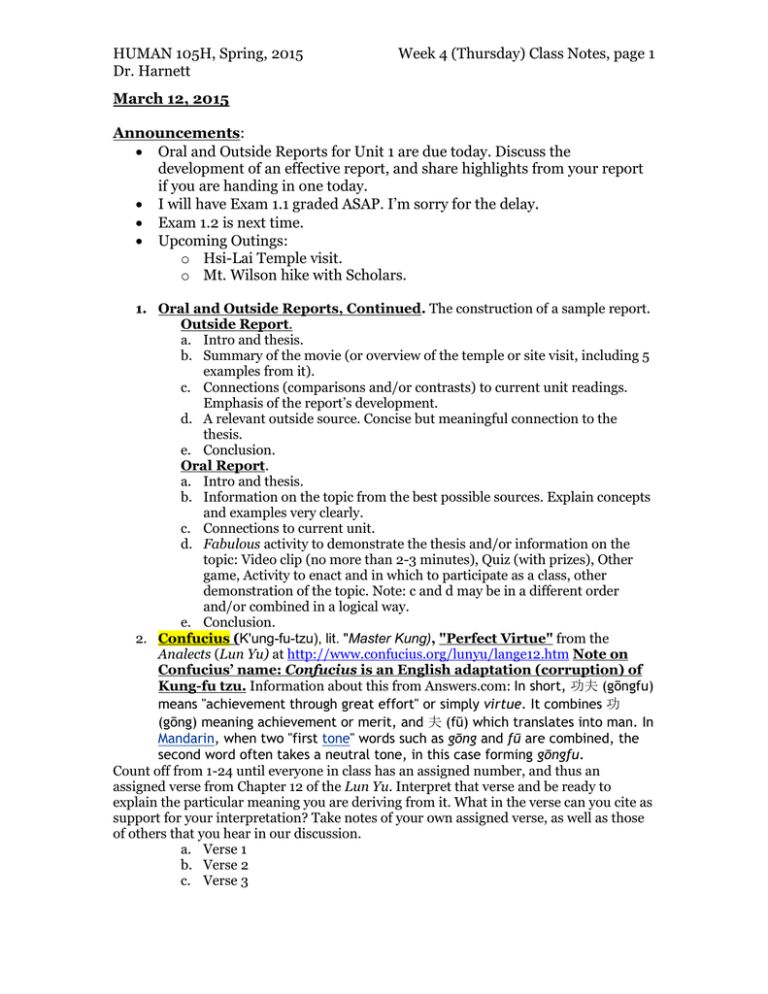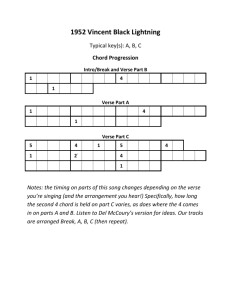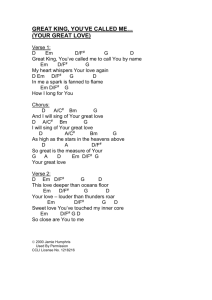HUMAN 105H, Spring, 2015 Week 4 (Thursday) Class Notes, page
advertisement

HUMAN 105H, Spring, 2015 Dr. Harnett Week 4 (Thursday) Class Notes, page 1 March 12, 2015 Announcements: Oral and Outside Reports for Unit 1 are due today. Discuss the development of an effective report, and share highlights from your report if you are handing in one today. I will have Exam 1.1 graded ASAP. I’m sorry for the delay. Exam 1.2 is next time. Upcoming Outings: o Hsi-Lai Temple visit. o Mt. Wilson hike with Scholars. 1. Oral and Outside Reports, Continued. The construction of a sample report. Outside Report. a. Intro and thesis. b. Summary of the movie (or overview of the temple or site visit, including 5 examples from it). c. Connections (comparisons and/or contrasts) to current unit readings. Emphasis of the report’s development. d. A relevant outside source. Concise but meaningful connection to the thesis. e. Conclusion. Oral Report. a. Intro and thesis. b. Information on the topic from the best possible sources. Explain concepts and examples very clearly. c. Connections to current unit. d. Fabulous activity to demonstrate the thesis and/or information on the topic: Video clip (no more than 2-3 minutes), Quiz (with prizes), Other game, Activity to enact and in which to participate as a class, other demonstration of the topic. Note: c and d may be in a different order and/or combined in a logical way. e. Conclusion. 2. Confucius (K'ung-fu-tzu), lit. "Master Kung), "Perfect Virtue" from the Analects (Lun Yu) at http://www.confucius.org/lunyu/lange12.htm Note on Confucius’ name: Confucius is an English adaptation (corruption) of Kung-fu tzu. Information about this from Answers.com: In short, 功夫 (gōngfu) means "achievement through great effort" or simply virtue. It combines 功 (gōng) meaning achievement or merit, and 夫 (fū) which translates into man. In Mandarin, when two "first tone" words such as gōng and fū are combined, the second word often takes a neutral tone, in this case forming gōngfu. Count off from 1-24 until everyone in class has an assigned number, and thus an assigned verse from Chapter 12 of the Lun Yu. Interpret that verse and be ready to explain the particular meaning you are deriving from it. What in the verse can you cite as support for your interpretation? Take notes of your own assigned verse, as well as those of others that you hear in our discussion. a. Verse 1 b. Verse 2 c. Verse 3 HUMAN 105H, Spring, 2015 Dr. Harnett Week 4 (Thursday) Class Notes, page 2 d. e. f. g. h. i. j. k. l. m. n. o. p. q. r. s. t. u. v. w. x. y. Verse 4 Verse 5 Verse 6 Verse 7 Verse 8 Verse 9 Verse 10 Verse 11 Verse 12 Verse 13 Verse 14 Verse 15 Verse 16 Verse 17 Verse 18 Verse 19 Verse 20 Verse 21 Verse 22 Verse 23 Verse 24 Overview: What are some examples of advice to individuals about being a good person? z. What is the top priority for being a good person, as far as you can tell? Explain. aa. What are some examples of advice about government or organizing and leading people? Which seems most important? Explain. Overview of Unit 1.2 Readings: What does each reading say about the foundation of a country? Readings Ideas/Founda tions of Government Confucius, "Perfect Virtue" (Chapter 12) from the Morality, Analects at Patience http://www.confucius.org/lunyu/lange12.htm Truth vs. Lying Immanuel Kant, “On a Supposed Right to Lie on Altruistic Motives” http://www.unc.edu/courses/2009spring/plcy/2 40/001/Kant.pdf [note: This reading is available on the website in COURSE MATERIALS.] St. Augustine, “On Lying” http://www.newadvent.org/fathers/1312.htm Lao-tzu, the Tao-te Ching: Chapters 3, 17, 19, 26, Moderation, 29-31, 37-38, 46, 53, 57-61, 65-67, 75, 80 at Wisdom http://classics.mit.edu/Lao/taote.html Equality Locke, Chapter 2 from Of Civil Government at Freedom HUMAN 105H, Spring, 2015 Dr. Harnett Week 4 (Thursday) Class Notes, page 3 http://www.constitution.org/jl/2ndtr02.htm Rousseau, The Social Contract, Book I at http://www.constitution.org/jjr/socon_01.htm Frost, "Mending Wall” at http://www.writing.upenn.edu/~afilreis/88/fros t-mending.html Justice Cooperation vs. Independence Possible Foundations for a Society: Justice Freedom Force Equality Of opportunity Of outcome Matriarchy Meritocracy Castes (ranks of class) Capitalism (profit) Religion Morality Education Stoicism Altruism Austerity/Simplicity Required Readings for the Exam (at least 4): Locke At least 3 others from Society segment of Unit 1 Note that this exam essay will involve your argumentative thesis as you propose and explain an efficient way of organizing and leading society, using the readings as your basis. Details of governmental operation are not as important for the purposes of this essay as are the principle of government that you advocate. Your careful, efficient development and explanation of insights, examples, and explanations will provide for a highly successful essay. Fun Facts: We are considering ideal governments and ideal countries, which is the imagining of utopia. The origin of the word utopia is a combination of Greek words translating to “not a place” or “nowhere.” If we use the homophone eutopia, that translates to “good place.” Samuel Butler wrote a satire of Victorian society in his book Erewhon (almost exactly the word nowhere backwards) in 1872. Exam 1.2 is next time. Open readings, open notes, as long as you prepared them.








